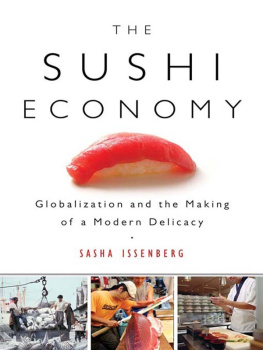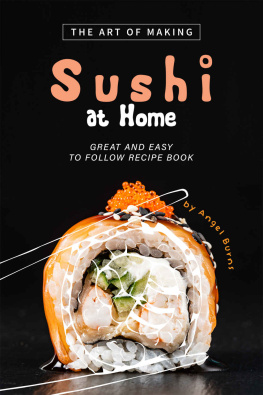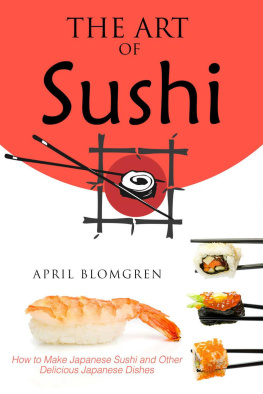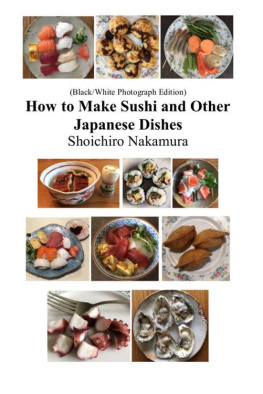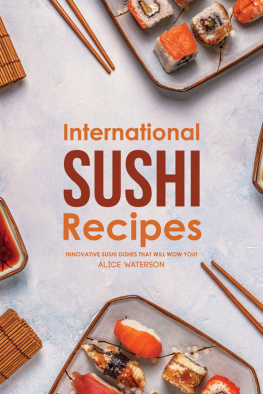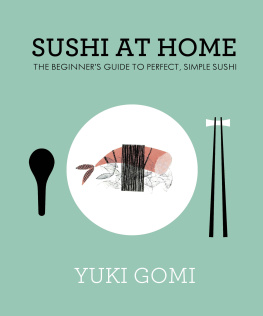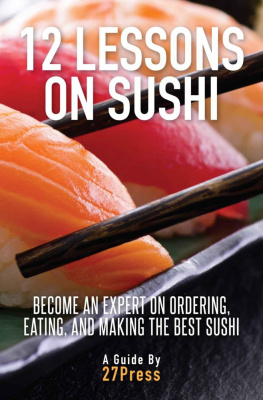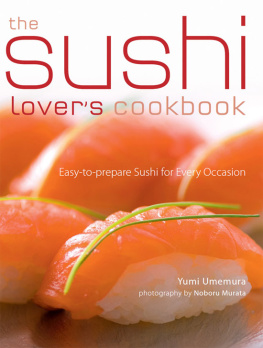THE SUSHI ECONOMY
Globalization and the Making of a Modern Delicacy
Sasha Issenberg

GOTHAM BOOKS
Published by Penguin Group (USA) Inc.
375 Hudson Street, New York, New York 10014, U.S.A.
Penguin Group (Canada), 90 Eglinton Avenue East, Suite 700, Toronto, Ontario
M4P 2Y3, Canada (a division of Pearson Penguin Canada Inc.);
Penguin Books Ltd, 80 Strand, London WC2R 0RL, En gland;
Penguin Ireland, 25 St Stephens Green, Dublin 2, Ireland
(a division of Penguin Books Ltd);
Penguin Group (Australia), 250 Camberwell Road, Camberwell, Victoria 3124,
Australia (a division of Pearson Australia Group Pty Ltd);
Penguin Books India Pvt Ltd, 11 Community Centre, Panchsheel Park,
New Delhi110 017, India;
Penguin Group (NZ), 67 Apollo Drive, Mairangi Bay, Auckland 1311,
New Zealand (a division of Pearson New Zealand Ltd);
Penguin Books (South Africa) (Pty) Ltd, 24 Sturdee Avenue, Rosebank,
Johannesburg 2196, South Africa
Penguin Books Ltd, Registered Offices: 80 Strand, London WC2R 0RL, En gland
Published by Gotham Books, a division of Penguin Group (USA) Inc.
Copyright 2007 by Sasha Issenberg
All rights reserved
Gotham Books and the skyscraper logo are trademarks of Penguin Group (USA) Inc.
LIBRARY OF CONGRESS CATALOGING-IN-PUBLICATION DATA
Issenberg, Sasha.
The sushi economy: globalization and the making of a modern delicacy / Sasha
Issenberg.
p. cm.
Cookery (Fish) Sushi. I. Title.
TX747.I74 2007
641.6'92dc22 2007003927
ISBN: 978-1-1012-1688-0
Without limiting the rights under copyright reserved above, no part of this publication may be reproduced, stored in or introduced into a retrieval system, or transmitted, in any form, or by any means (electronic, mechanical, photocopying, recording, or otherwise), without the prior written permission of both the copyright owner and the above publisher of this book.
The scanning, uploading, and distribution of this book via the Internet or via any other means without the permission of the publisher is illegal and punishable by law. Please purchase only authorized electronic editions, and do not participate in or encourage electronic piracy of copyrighted materials. Your support of the authors rights is appreciated.
While the author has made every effort to provide accurate telephone numbers and Internet addresses at the time of publication, neither the publisher nor the author assumes any responsibility for errors, or for changes that occur after publication. Further, the publisher does not have any control over and does not assume any responsibility for author or third-party Web sites or their content.
To Ludwik Brodzki,
for teaching me why to read
and
To John Kennedy,
for showing me why to write
Contents
P RINCE E DWARD I SLAND, C ANADA
The Day of the Flying Fish
The birth of modern sushi
T OKYO, J APAN
Tsukiji
Shopping at a global market
N ARITA, J APAN
The Hub
How Narita Airport became Japans top fishing harbor
T OKYO, J APAN
Fast-Food Metropolis
Feeding sushis hometown
L OS A NGELES, C ALIFORNIA
Are You Ready for Rice Sandwiches?
How sushi became the favorite food of the capital of the twentieth century
P ARADISE I SLAND, B AHAMAS
New Style
How a Japanese-Peruvian Angeleno created a global sushi vernacular
A USTIN, T EXAS
Lone Star
The education of a sushi shokunin in cowboy country
G LOUCESTER, M ASSACHUSETTS
Imperfect Storms
Weathering boom and bust in the hunt for Boston bluefin
P ORT L INCOLN, A USTRALIA
Meanwhile, Back at the Ranch
How the tuna cowboys became tuna barons
M ADRID, S PAIN
The Raw and the Crooked
On the trail of pirates, launderers, and tunas black market
D ALIAN, C HINA
Port of Call
A Japanese mogul plots to take the worlds last sushi frontier
T OKYO, J APAN
Raw Deals
Introduction
World Gone Raw
A lot of sushi diners talk of needing their fix, but it might not be addiction that keeps them coming back as much as a desire to briefly escape the modern world. A simple room of unadorned wood and bright lights, the sushi bar does appear to be a place out of time. Food is identified, with hunter-gatherer austerity, simply by its genus, but familiar personalities stand out among the cast of aquatic characters: confidently recoiling abalone, smoothly dense Spanish mackerel, crisp ark shell, softly evanescent tuna. The reaction of diners receiving this parade of small joys tends to be consistent. Eyes roll upward, stuffed cheeks and busy jaws withstand a compressed smile, as every part of the face individually savors each sensation: the bracing coolness of the fish, its curvature as it is pressed into lightly seasoned rice, the residual warmth of the hands that formed it, the supple resistance of fish flesh as teeth make contact, the slow dissolution of meat on the tongue.
Heads nod appreciatively in the direction of the chef. Amid a kitchens arms race marked by Viking Ranges and unconventional instruments like syringes and aerosolizers, the sushi chef elicits thoughtful bliss from untreated seafood using nothing more than a sharp, large blade and a pair of unusually dextrous bare hands. Japanese history killed off the samurai at the same point in the mid-nineteenth century that it birthed the sushi chef, and a significant inheritanceto be a lone, knife-wielding guardian of honor and orderwas bequeathed at that time. The role of the sushi chef, in its crude simplicity and reliance on a code of courtliness and traditional craftsmanship, rejects modernitys technical accoutrements in an era when the kitchen has been turned into a laboratory. (As if to signal the almost prehistorical nature of his job, the sushi chef operates without fire; for the rare, cooked item, like reheating a piece of broiled eel, he relies on a rickety toaster oven.)
At restaurants of all sorts, menus are now filled with highly detailed prose designed to comfort consumers unsettled by the increasing distance between their plate and the origins of the food that sits on it. Poultry dishes carry the label free-range, cuts of beef come from a grass-fed cow, the seafood was either line-caught or hauled in via dayboat, and the days specials can contain greater detail about harvest rhythms than the Farmers Almanac . Menus have elevated small farms and family orchards into the register of familiar place-names. Sushi, however, arrives in front of customers with virtual anonymity, accompanied by none of the where-when-how provenance now afforded to a humble roasted chicken. All diners see of their meals origins is the chef who prepared it, as he removes a piece of fish from the refrigerated case in front of them, slices it on the cutting board before their eyes, places it on rice, artfully arranges it on a plate, and serves it onto the counter. In an age of factory kitchens and take-a-number ser vice, many find the simple transparency of this culinary transaction refreshing. But the exchange is also misleading.
Standing sentinel over a glass caisson of small, plastic-wrapped pylons of fish, the sushi chef is merely a charismatic front man for an invisible world. Behind him is a web of buyers and sellers, producers and distributors, agents, brokers, and dealers that extends from everywhere there is a net that needs to be emptied to anyplace there is a plate that can be filled. On their way from the ocean to the restaurant, some fish take a multicontinental voyage of days, weeks, and, in certain cases, months or years, crossing borders, being subjected to tariffs, having value assessed more than half a dozen times, and visiting more airports than most business travelers.

